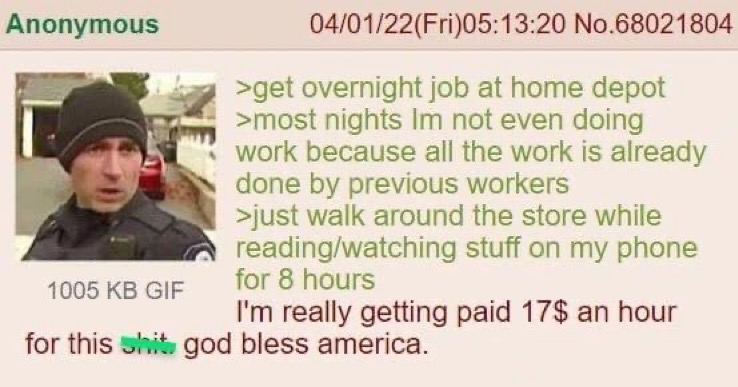this post was submitted on 08 Jan 2025
379 points (93.0% liked)
Greentext
4741 readers
2017 users here now
This is a place to share greentexts and witness the confounding life of Anon. If you're new to the Greentext community, think of it as a sort of zoo with Anon as the main attraction.
Be warned:
- Anon is often crazy.
- Anon is often depressed.
- Anon frequently shares thoughts that are immature, offensive, or incomprehensible.
If you find yourself getting angry (or god forbid, agreeing) with something Anon has said, you might be doing it wrong.
founded 1 year ago
MODERATORS
you are viewing a single comment's thread
view the rest of the comments
view the rest of the comments

It's somewhat the same argument for universal income. Gives people time to learn valuable skill sets without giving all their time and energy to some company.
I agree, though I prefer the Negative Income Tax formulation over Universal Basic Income, for the simple reason that there's a lot less bookkeeping (only need to pay out for people making <$X). Ensure everyone is over the poverty line whether employed or not and we can eliminate the minimum wage and people will likely be better off since they can pursue their passions (which they'll likely be a lot more productive at) instead of doing whatever makes enough money.
Not disagreeing with the idea, but it seems like this would also have the side effect of incentivizing employers to aggressively and artificially reduce wages and pass that burden on to the taxpayer, if you're eliminating minimum wage.
I think it's an interesting idea, but one that seems prone to abuse by unethical parties. Not that our current system is immune to that either.
My state has no minimum wage, so we inherit the federal minimum wage ($7.25 IIRC), yet starting wages tend to be $10-12 in my suburb (probably higher closer to downtown) and median is $13 for fast food.
Yeah, companies will probably try to reduce wages, especially if those wages are essentially subsidized by NIT. But at least in my area, that would only happen if worker supply increases (in this case from people quitting worse jobs). Since almost nobody actually works for minimum wage here, I don't think that's a major concern.
On net, workers would probably be better off. I think we'd see a bit more intentional unemployment, which should drive wages up instead of down.
The main people who would lose out are middle class people relying on Social Security for retirement. We could balance that by removing the income cap on Social Security to preserve some traditional benefit for retirees (I propose income caps for benefits).
Ah, that's actually really great. I always wondered how UBI would work on a large scale when already wealthy people are in the mix. I mean, they don't exactly need it.
They'd basically pay it back in taxes. But the tax bill looks super unattractive for UBI for any reasonable amount ($15k is federal poverty line, which is ~$4.5T assuming 300M people).
NIT could probably replace Social Security without changing taxes at all. There are ~37M people in poverty, which is $550B, and Social Security spends $950B every year. If it replaces other welfare programs or if we lift the income cap, we could increase benefits, and states could chip in their own as well. We could also phase it in, so people under some age only get NIT, while people over some age only get SS. If it works as intended, we should decrease beneficiaries over time as people break the cycle of poverty and start businesses and whatnot.
I think it's totally feasible.
I agree. I'm lucky I got this opportunity which really made me believe in social safety net as an ideology. So many people are stuck because there just no time to respecialize and re-invest your human resources. Automation, AI, robotics are only a problem because of this. If AI can take taxi driver's job and the taxi driver has the support to re-specialize to something more fulfilling then it's a win-win for everyone.
That's the dream.
Not the American one though sadly.